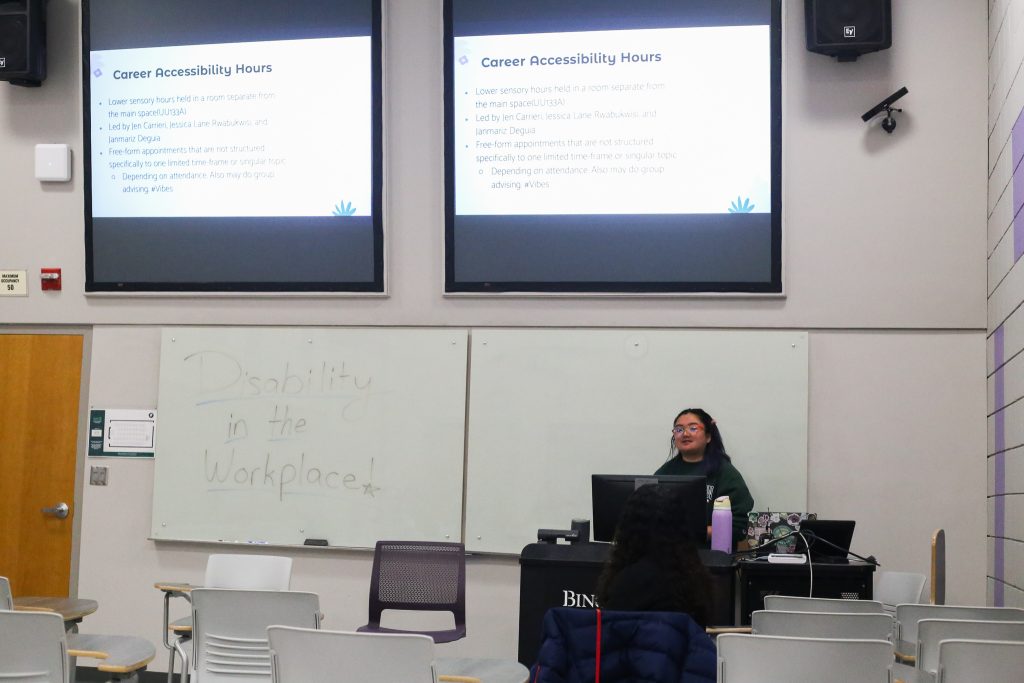The Neurodiversity Club and the Disabled Student Union hosted a panel discussion with two disabled professionals to discuss the challenges disabled people face in the workforce.
The talk, held Thursday in Lecture Hall 13, fostered an open discussion concerning how individuals with mental and physical disabilities navigate the workplace. According to the U.S. Department of Labor, over 22 percent of disabled people were employed in 2023 — a lower participation rate than the nondisabled workforce.
“The Disability in the Workplace is a student-led collaboration between the Disabled Student Union and the Neurodiversity Club which aims to introduce our community of young disabled professionals to resources for them to further their personal and professional careers both on and off campus,” Janmariz Deguia, DSU president and a junior majoring in human development, wrote in an email.
The panel kicked off with a brief presentation of resources the University offers for disabled people, including lower-sensory advisory hours at the Fleishman Career Center, which are held separately in a less harsh sensory environment. Services for Students with Disabilities also offers “students with disabilities study hours” in the Union.
A Q&A panel featured two young professionals managing mental and physical disabilities — Amanda Roberto, a mental health counselor in Binghamton recently diagnosed with ADHD, and Michael Trapani, a senior associate registrar at Binghamton University who has used a wheelchair for the last six years. The two guests shed light on topics, like misunderstandings surrounding their disabilities and identifying as disabled, and provided insight on gaining and adjusting workplace accommodations.
“Even people that love and care about me the most are not seeing a problem because I was masking so well or performing so well in certain areas,” Roberto said. “The areas I was struggling in, they were like ‘we don’t understand because you can do this so good, why can’t you do that?’”
Trapani shared his experience using a wheelchair while working and attending meetings. He said a supervisor recently obtained a standing frame, allowing him to stand during meetings and addressing a power imbalance that occurs when someone is standing and sitting. Though his experience is not shared by all disabled people, he said self-advocacy is an important tool for navigating the workplace. He recommended researching available accommodations when assimilating in unfamiliar environments.
“We believe that representation matters, so the main goal of these events is to promote representation of disabled people in as many fields as we can so that our general body can hopefully see themselves in the careers they want to pursue,” Jubilation Yeh, the president of the Neurodiversity Club and a junior double-majoring in environmental science and chemistry, wrote in an email.
The event fostered an open, lively discussion of sensitive issues and challenges faced daily by professionals managing disabilities. At its conclusion, an audience member asked how to cope with people’s perceptions of a person shifting once they learn of their disability. Roberto responded, saying that being open about her ADHD diagnosis with her patients has created a more transparent relationship, allowing her to more accurately picture what they are going through.
Trapani described people’s initially shocked reactions upon meeting him, especially after already conducting business over video calls where his disability had not been apparent.
“Our hope is that showing representation of different disabilities across different fields and demographics will help our general bodies to see themselves succeeding in whichever fields they wish to pursue — not ‘in spite’ of their disabilities (though sometimes it may feel that way, as disabilities by definition impair daily life) or ‘because’ of their disabilities (as many well-meaning but often uneducated people may say), but simply just ‘with’ them,” Yeh wrote.



